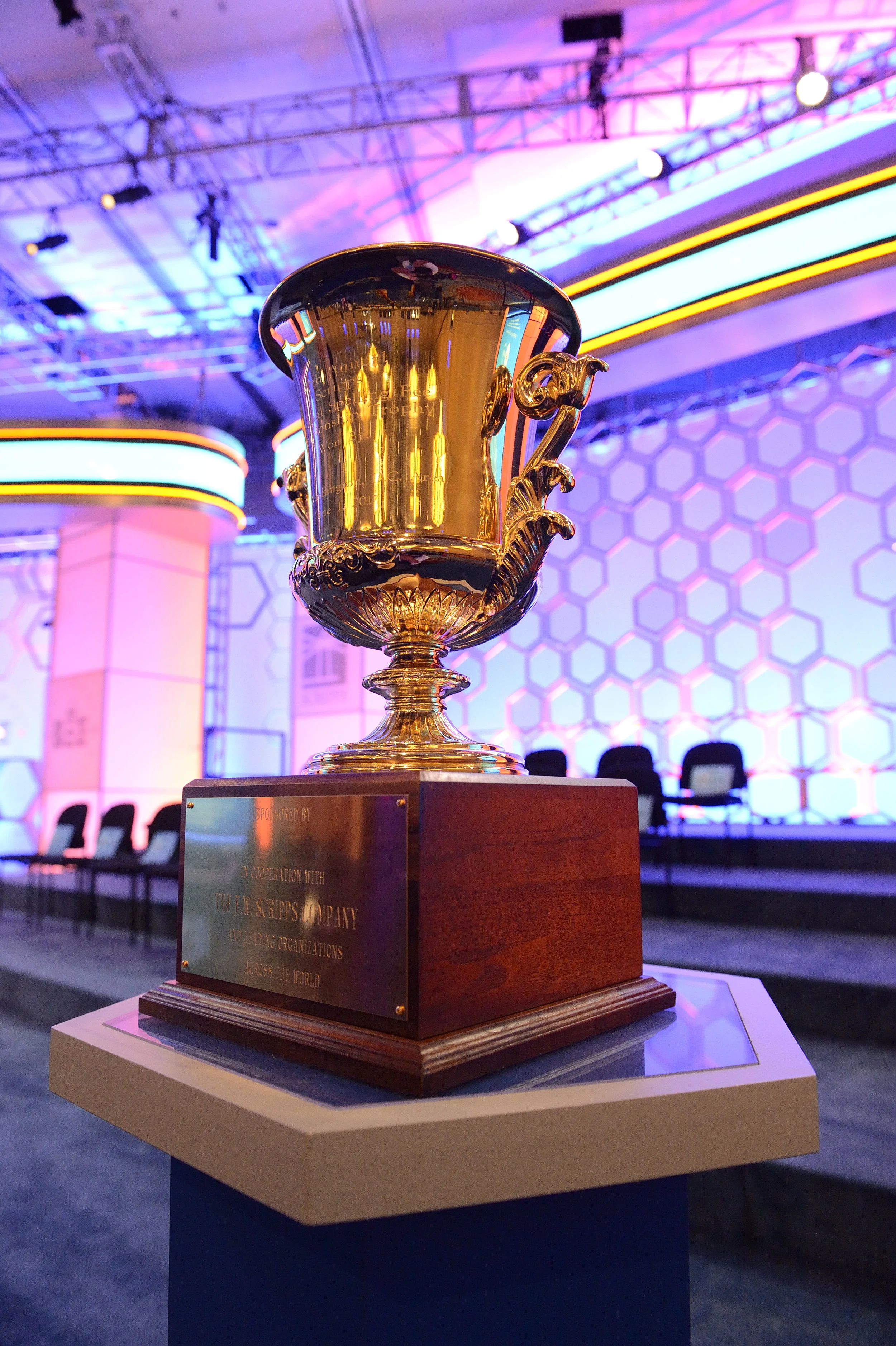The UVM Professor, As Seen on TV
By Andrea Estey // Photography by Will Kirk | August 2017
This article originally appeared in Vermont Quarterly
IN 1980, AFTER TWO GRUELING DAYS OF COMPETITION, a fourteen-year-old boy from Denver named Jacques Bailly won the National Spelling Bee. His winning word: “elucubrate,” meaning to study or work hard at night.
“I was wearing white pants and I had a bowl haircut,” says Bailly, remembering the night of his championship. “And I worked very hard to prepare, about three hours a day, because of course, it’s not just spelling. It’s knowing the words, their history, their meaning. Words open doorways.”
That love of words, which Bailly describes as a “drifting snowball that keeps growing and growing,” eventually led to studying Ancient Greek and Latin. Today, he’s a professor of classics at UVM, but you may know him better from his other gig as lead pronouncer of the Scripps National Spelling Bee, the same bee he won thirty-seven years ago.
The bee is televised live each year on ESPN. Since Bailly assumed the role of lead pronouncer in 2003, he’s become a bit of a pop culture icon, even appearing as himself in the 2006 film Akeelah and the Bee. In recent years, the bee has started hiring comedy writers to compose many of its sentences; Bailly’s dry comedic delivery of these jokes, combined with his earnest, bespectacled smile and calm demeanor, has drawn even more attention his way. During this year’s bee, “I was personally trending on Twitter,” laughs Bailly. “I’m a national treasure.”
But spot him on campus, and you’d never guess he moonlights as a primetime TV star. “I can count on the fingers of one hand the number of people who have recognized me outside of D.C., when I’m at the spelling bee. There, everybody knows me. But look at me now,” says Bailly, sitting in Henderson’s Café in the Davis Center. “I mean, I have a Webster’s Dictionary cap on and a spelling bee t-shirt. But there’s paint all over my shorts.”
In fact, it takes most of his students at UVM some time to put it together. “Usually about halfway through the semester, I’ll get a question like, ‘I was looking up our course and I came across your Wikipedia page. Are you really the spelling bee pronouncer?’ They usually think it’s pretty cool, especially the etymology class,” Bailly says.
“Spelling is a gateway skill, and it opens the door to chemistry, to literary studies, to physics, to geography. It opens your mind to the fact that these concepts exist. Words become things that don’t scare you anymore.”
Jacques Bailly
The lobby of Gaylord Convention Center in National Harbor, Maryland, just outside of D.C., feels a bit like a Las Vegas resort: grand, excessive, and flashy, with glittering chandeliers, polished floors, water features, and sweeping views of the Potomac River.
A spelling bee sounds quaint, but the Scripps Bee is not your elementary school gym kind of affair. That, says Bailly, is one important piece of motivating, and rewarding, contestants for their hundreds of hours of preparation. “Going into this marble atrium, in a huge building, and knowing that it’s all about you, for you, it’s not the dingy linoleum hallway and the theater that could use a facelift. It’s all sparkly and perfect,” says Bailly. “I think that’s part of what’s really exciting for the kids.”
Another source of excitement for spellers? The chance to get an autograph from Bailly. Inside the bee, fans approach him at every turn. “At home, they’ve heard my voice all year because they have recordings of past bees so they can get the pronunciations correct,” says Bailly. And, of course, for fans who have watched the bee for years, Bailly is as recognizable as any TV announcer.
Past the convention center’s lobby and up a series of escalators is the “Hall of Champions,” a celebration of past winners and their words dating back to the first bee in 1925, including a massive banner depicting teenage Jacques Bailly, holding his trophy triumphantly overhead.
Beyond this cavernous hall is the ballroom, the place where bee magic happens. Spanning one side of the room is a massive, brightly lit stage, set with rows of chairs where spellers wait to be put to the test by Bailly and a panel of officials, who sit in a row facing the stage. In Bailly’s day, there were just one hundred contestants from around the United States. In 2017, there were 275 spellers representing eleven different countries; Bailly says of those spellers, there are probably twenty-five who can spell just about anything.
No pressure.
Even in the early rounds of the competition, tensions run high. The contestants on stage shift in their seats, and the ballroom is filled with anxious family members and friends. Toward the front of the room, the younger brother of one contestant stands on a chair, muttering prayers under his breath with eyes clamped shut and hands clasped. Just off-stage, in an area one mom calls the “sad couch,” an eliminated contestant and his family cling to each other in tears.
Some might wonder: is it too much pressure? “When I teach classics, I always talk about this famous moment by Hesiod. He says there are two kinds of strife or competition. One is constructive, one is destructive. I think that we need to emphasize constructive competition, the kind where you’re in it to win, but you’re also in it to have other people challenge you, and it’s not a real challenge if you’re not wanting them to succeed, too. It’s a good lesson,” Bailly says.
It’s true that contestants root for one another. On stage, the bonds between them are evident. They exchange high-fives each time a speller gets a word correct. In the audience, eliminated spellers whisper to each other about syllable counts and Latin roots, the way you might expect children to whisper about playground drama. In all, the bee feels a bit like a brainy summer camp, a one-of-a-kind bubble that spellers are eager to return to, year after year. Here, they’re surrounded by their peers: the best and the brightest from around the world.
“It’s not important to me who wins or how they place. They’ve done all the studying we can get them to do. The learning has been done,” says Bailly. “I also think, you can win with grace or not, and you can go as far as you can go and do that with grace or not. It’s like, if you’re an entrepreneur and your first project fails, you have to get up and dust yourself off. You learn something. Getting up on stage in front of people, whether it’s people you know or it’s on national TV, it doesn’t seem to make a difference. That moment is inscribed in your memory, and handling that gracefully is something that’s inscribed in your soul.”
Recently, the media has focused on the number of highly successful Indian-American spellers in the bee. In fact, the last ten bees have been won by spellers of Indian descent, some of whom are first-generation. This drive and curiosity around language is something Bailly, a fellow first-generation American on his father’s side, can relate to. “Any child who has another language hanging in the wings waiting to be used, it gives them a huge leg up,” says the classics professor. His father came to the United States from France in 1948, and he spent time as a child studying French and visiting his relatives overseas.
Bailly’s fifth grade teacher was the first to introduce him to the roots of words. That, says Bailly, turned on a whole network of thinking in his brain. “Spelling is a gateway skill, and it opens the door to chemistry, to literary studies, to physics, to geography. It opens your mind to the fact that these concepts exist. Words become things that don’t scare you anymore.”
If you watch the spelling bee, you’ll probably hear many words you’ve never heard before. There’s something refreshing and exciting in the idea that there’s so much more to know about our world —from an Irish dance (rinkafadda) to nail fungus (onychomycosis) to a dress fabric (marocain, this year’s winning word).
As Professor Bailly points out, America is the only country in the world where you could really have a spelling bee, “because we have so many different mixed systems of spelling.” The bee serves as a reminder of this specialness. Language, at its core, is a reflection of all of its speakers, those past and present, an amalgamation of times and traditions, colorful and complicated. Encouraging people to expand their knowledge of language in a holistic way, says Bailly, is really what the bee is all about, not a trophy.
And, of course, the spelling bee also serves as a reminder that yes, there are probably eighth graders who are smarter than you.




